Commentary
Social inclusion key to equity in the Americas
Betilde Muñoz-Pogassian of OAS underscores need for intersectionality
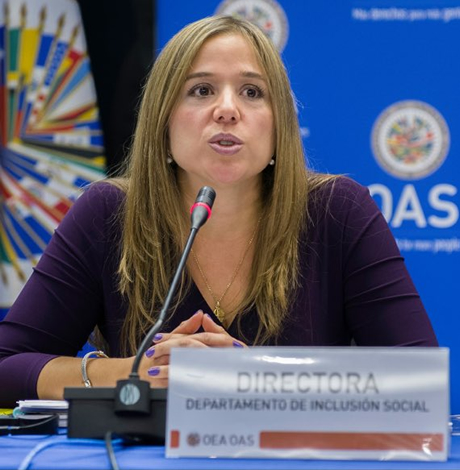
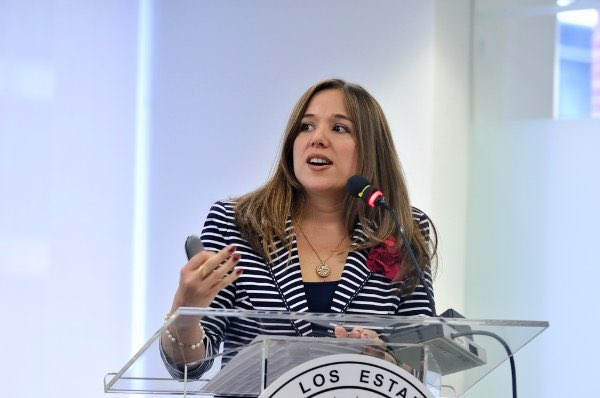
Dr. Betilde Muñoz-Pogossian is the director of the Organization of American States’ Department of Social Inclusion of the Secretariat for Access to Rights and Responsibilities. (Photo courtesy of Geovanny Vicente Romero)
Editor’s note: Geovanny Vicente Romero is the Washington Blade’s newest contributor who seeks to highlight the LGBT rights movement in Latin America and efforts to extend rights to these communities.
Women’s empowerment, eradicating hunger and poverty and promoting the inclusion of people who are vulnerable. Many of those who are often treated as second-class citizens — such as people of African descent, indigenous people and members of the LGBTI community — do not have equal access to basic benefits and services as well as the protection human rights in general. These issues are part of the life and works of Dr. Betilde Muñoz-Pogossian, director of the Organization of American States’ Department of Social Inclusion of the Secretariat for Access to Rights and Equity.
Muñoz-Pogossian is Venezuelan with a PhD in political science from Florida International University in Miami and a master’s degree in international relations from the University of South Florida in Tampa, Fla.
Her more recent publications include the volume “Equity and Social Inclusion: Overcoming Inequalities Towards More Inclusive Societies” in 2016; and “Women, Politics and Democracy in Latin America” in 2017 from the “Crossing Boundaries of Gender and Politics in the Global South” series. Following her tenure of more than a decade as the OAS’ political-electoral secretariat of the OAS, in 2015, Muñoz-Pogossian assumed the leadership of working on social inclusion issues at the OAS General Secretariat.
She recently spoke with the Washington Blade in D.C. about the progress made and the main challenges regarding the equity agenda in the Americas.
BLADE: What is equity? What are the key issues in the equity agenda in the Americas?
Muñoz-Pogossian: All human beings, from the time we were kids, understand how situations of inequity feel; those situations in which due to gender, race, age, migration status, ethnicity, sexual orientation or identity, a person cannot enjoy their rights and cannot have access to all goods and services in a society. We are all equal before the law. That is a basic obligation of democratic governments. But equity is something else. Equity makes evident the differences amongst all individuals, of their life trajectories that often impede equal access to opportunities. It seeks to generate conditions to level the playing field so that all can effectively have access to education, health, housing, social protection, jobs, to the benefits of economic growth and development throughout their life cycle, and ultimately, to all their human rights. Because the Americas continues to be the most unequal region in the world, the General Secretariat of the OAS has decided to prioritize its efforts to promote more equity in the region, and to contribute to ensuring more rights for more people.
Apart from eradicating poverty and extreme poverty, the regional equity agenda must be focused on the social inclusion of populations in situations of vulnerability. The emphasis should be placed on promoting and ensuring the enjoyment of the rights of children and youth, people of African descent and indigenous peoples, LGTBI people, people with disabilities, and to continue moving forward with the gender equity agenda. This is where we have had the most progress, but where there is still much to be done.
This work needs to focus, on one hand, on generating conditions of real democracy where these populations can, on a comparable basis as the rest of the members of society, enjoy their civil and political rights, namely, to elect and be elected, to have influence in decision-making processes, and to have incidence in the political agenda. On the other hand, the equity regional agenda must refine the series of public policies that have been implemented so far to ensure a more equal distribution of the benefits of economic growth and development. But we must also move one step further regarding economic and social rights. More political will is needed to ensure the full socio-productive inclusion of these populations, and to ensure a life free of discrimination for all. This, in the end, has everything to do with their capacity to exercise their civil and political rights. Which person who has to provide for his or her basic needs regarding food, housing or health can effectively enter the political arena and compete for public office? The discussion regarding what to prioritize is a national one. The fact is, however, that the continued existence of socioeconomic inequities that are replicated in the power asymmetries in the political sphere have a negative impact for the stability of our democracies, and on the levels of citizens’ trust in political institutions. This is something that should concern us all.
BLADE: Which progress should we celebrate? Which challenges should we prioritize?
Muñoz-Pogossian: One of the most important achievements in the last few years has been to have moved the scale in favor of the gender equity agenda. Women’s right to vote is today the norm in all countries of the Americas, and legal frameworks guarantee their right to be elected. According to data from ECLAC (Economic Commission for Latin America and the Caribbean), the average number of national female legislators went up from 9 to 25 percent between 1990-2015. Today practically all countries of the region have implemented quota or parity reforms, and some have even legislated in favor of targeted political financing for female candidacies. This has been manifested in greater representation of women in national legislatures, in ministerial cabinets, and although in 2018 we will only have one woman directing her country’s future in Trinidad and Tobago, we have had a number of women as heads of state in a few Latin American countries.
The challenge that we must prioritize is actually a historic debt that we have as a region. We have about 200 million Afro-descendants and 50 million indigenous people in the region. These populations are generally in the most vulnerable situations: 90 percent of these populations in the countries of the region live in poverty or extreme poverty, and in many cases, do not enjoy universal access to health, education, housing and potable water. This perpetuates a situation of political underrepresentation. At the same time, this translates into the formulation of public policies that do not consider the ethnic specificities of these populations, which again affects the representativeness of the decisions that emerge from the political system, and people’s trust in democracy.
BLADE: What is the OAS doing to promote the equity agenda in the region?
Muñoz-Pogossian: At the OAS Secretariat for Access to Rights and Equity for its Department of Social Inclusion, we strive to give our support to member states in their efforts to address inequality in all its forms using an integral, inclusive and sustainable approach. We base our work in the commitments established in the OAS Charter, the Social Charter of the Americas, the Inter-American Democratic Charter, the Protocol of San Salvador, and the numerous inter-American juridical instruments on human rights. The OAS work on the equity agenda is organized along three key strategic lines:
1. Supporting intersectoral dialogue processes at the highest level to capitalize national capacities, both human and institutional, as well as to promote the exchange of lessons and solutions that contribute to the full exercise of all human rights by the people of the Americas.
2. Promoting and strengthening efficient cooperation strategies and the generation of alliances amongst countries of the region to promote social inclusion and the exercise of economic, social, and cultural rights, to contribute to the eradication of poverty and extreme poverty in particular, and to revert situations of inequity and discrimination.
3.Accompanying countries of the region to fulfill obligations contained in the inter-American normative frameworks regarding development, social inclusion and no discrimination of groups in vulnerable situations, to ensure the effective protection of their human rights.
We at the OAS understand equity as the goal, and social inclusion as the process to achieve it. Promoting more rights for more people is our strategy to tip the scales in favor of equity in the region.
At the end of the conversation with Muñoz-Pogossian, it is clear that, although there is much to do, there has been important progress made in our region to ensure more social and political equity. It is also clear that we have the tools to do it. Via legislation, administrative measures and public policies with a rights-based perspective, we can reverse situations of inequity. The work is monumental, urgent and difficult because we are dealing with people who are in highly vulnerable situations. The work, however, is worth it because it brings us closer to having better democracies and better societies.
Commentary
Preserving our tapestry: Navigating European elections, empowering queer women and the imperative of safe spaces
EU elections will take place in June 9

As the European Union anticipates the upcoming elections in June, a disconcerting wave of transphobic rhetoric has swept across the continent, notably in 21 EU member states, according to a recent report by ILGA-Europe. The 13th Annual Review of the Human Rights Situation of LGBTQ People in Europe and Central Asia stresses the alarming rise in hate speech targeting the LGBTQ and intersex community. This growth in negativity — which particularly is directed at transgender people — raises profound concerns about the state of inclusivity, human rights and democracy within the EU.
The alarming surge of transphobia in European politics
According to the report, there is a trend of hate speech coming from politicians across 32 European countries of which 21 being EU member states. Painting a stark picture of the challenges faced by the LGBTQ community. In a staggering list that includes Austria, Germany, Spain and others, politicians have increasingly weaponized anti-trans rhetoric. Exploiting children is a tactic often used as part of scare strategies to create opposition to trans minors’ access to healthcare and educational facilities, extending this divisive approach to a broader trend where politicians argue that restricting information about LGBTQ people is a necessity to protect minors.

The rise in transphobic rhetoric is not only confined to politics but it has other tangible consequences. The report highlights a concerning escalation in suicide rates and mental health issues, particularly in LGBTQ youth. Violent protests outside schools and libraries have created unsafe environments, adding to the growing list of challenges faced by the community.
The far-reaching impact of demonization by politicians and the introduction of restrictive legislation underscores the need for urgent action. Hate speech is not merely an affront to people’s rights, it is an assault on the very core values upon which the EU was founded. As ILGA-Europe Advocacy Director Katrin Hugendubel notes, human rights, especially those of LGBTQ people, are facing a significant challenge from far-right forces. The exploitation of LGBTQ rights to undermine democracy, human rights and the rule of law highlights the divisive nature of the current political landscape.
As ILGA-Europe prepares to launch the “Come Out 4 Europe” campaign in response to these alarming trends, the need for visible and supportive queer female spaces is more apparent than ever. The campaign, seeking commitments from European Parliament candidates to protect the rights of LGBTQ people, underscores the urgency of safeguarding human rights, democracy and freedom.
The crucial role of queer women in European elections
Belgium, amid this backdrop of rising transphobia, is preparing for the European elections on June 9, 2024. The importance of this electoral process cannot be overstated, especially for queer women. With citizens aged 16 and above casting their votes to elect 22 members of the European Parliament (MEPs), it’s a pivotal moment for the LGBTQ community.
The voting process in Belgium follows EU law, utilizing a proportional representation system. Voters choose one party, either by marking the box above the party list or selecting individual candidates on the list. The total ballot forms for each party determine seat distribution, and preferential votes then decide which candidates secure a seat in the European Parliament.
Educated voting in the European elections is essential to queer women and the importance cannot be stressed enough. Throughout history they have faced unique battles, but this community holds the power to shape policies that directly influence their lives. By engaging in the democratic process, queer women can actively challenge the current surge in hate speech towards trans people by voting for electing representatives who actively advocate for LGBTQ rights.
Representation is more than a mere buzzword. It matters. Understanding candidates’ positions on LGBTQ issues is key and requires educating oneself on candidates’ stances as to allow queer women to vote for representatives who genuinely champion LGBTQ rights. A diverse and inclusive representation ensures that the concerns and voices of the queer community are not just heard but which are acted upon. Decisions within the European Parliament influence policies ranging from anti-discrimination laws to access to healthcare. An informed vote makes sure that legislation promotes equality, acceptance and the protection of LGBTQ rights.
By being educated on the European elections and its candidates, queer women embark on a journey of self-empowerment. By supporting candidates who prioritize inclusive curricula, they contribute to addressing LGBTQ history, health and rights, encouraging a more accepting future.
The undeniable need for physical queer women spaces
Since the European elections are nearing, the importance of physical spaces for queer women to gather and discuss voting and the candidates becomes increasingly evident. While online spaces offer the chance to connect and discuss, they come with their own unique challenges, including the spread of misinformation and miscommunication. In navigating the democratic landscape, the value of in-person gatherings for education and discussion cannot be stressed enough.
The world is saturated with digital information, and misinformation can easily infiltrate online spaces. Physical gatherings allow for a more controlled environment with direct feedback from peers, where queer women can share accurate and reliable information, ensuring a more nuanced understanding of candidates, policies and the electoral process.
In the lead-up to the European elections, we have to recognize that physical spaces for queer women are crucial. They do not only combat misinformation, disinformation and miscommunication but also serve as a vital space for shared learning. In-person gatherings create the foundation for an informed and engaged electorate, promoting a collective voice that resonates in the democratic process. The power of change lies not just in our votes but in the shared wisdom and unity forged in the physical spaces we create together.
The plight of the Crazy Circle and the call for investment in queer women spaces
After the closing of Brussels’ iconic Crazy Circle, a feminist queer space that has served as a safe haven for the LGBTQ community, it becomes increasingly evident that the struggle for queer women-only spaces in Belgium is a critical issue demanding our attention.
For the past five years, Crazy Circle has been a testament to the resilience of the LGBTQ community, creating a safe and celebratory space for queer women and their allies. However, its closure after the previous management leaving for unknown reasons and current fundraising attempt by the new owners to reopen highlight the challenges faced by such spaces in Belgium. These establishments play a vital role not only as social hubs but as catalysts for education, empowerment and advocacy. Fortunately for the new owners they recently reached their fundraising goals and raised over 50,000 euros to reopen Crazy Circle.
The loss of a space like this underscores the broader struggle faced by queer women-only spaces in Belgium. Beyond being social hubs, these spaces are vital agents of change, providing a haven for education, empowerment and advocacy. We must recognize that our commitment to the LGBTQ community extends beyond words.
The “Come Out 4 Europe” campaign by ILGA-Europe serves as a proactive response to the alarming trends in hate speech. It calls for clear political commitments on safeguarding human rights, democracy and freedom from candidates in the upcoming European Parliament elections in June. Belgium, with its own elections on the horizon, stands at a crossroads where the choices made will resonate far beyond its borders.
If we want to inform queer females about campaigns like “Come Out 4 Europe” we need spaces like the Crazy Circle. Its closure is a stark reminder of the fragility of these vital spaces. It’s a call to action, urging us to invest more in preserving and expanding queer women-only spaces. The struggle faced by Crazy Circle is not an isolated incident; it reflects a broader challenge that demands a collective response all over the world.
By fighting to preserve and expand queer women-only spaces, we are not merely safeguarding physical venues. We are investing in the education, empowerment and advocacy of the LGBTQ community. These spaces are not mere bars or gathering spots; they are crucial agents of change and empowerment.
Building a future of inclusivity
As we see what happened to Crazy Circle in Belgium, let us use this moment as a catalyst for change. It is time to rally together behind existing queer women spaces, ensuring their survival and actively working towards expanding and creating new ones. By doing so we empower individuals to educate, advocate, and, most importantly, vote for a future where safety, equality and acceptance prevail for all members of the LGBTQ community. It’s not only a matter of choice to preserve these spaces; it is a commitment to a world where everyone has the right to be safe, heard and celebrated.
In navigating the complex tapestry of the European elections, the empowerment of queer women spaces through informed voting and the preservation of physical queer women spaces become integral threads. As we stand on the precipice of change, our choices today will shape the inclusive and accepting future we envision. Together, let us weave a tapestry that celebrates diversity, protects human rights and builds a future where every voice, especially those of queer women, is not just heard but cherished.
Commentary
Returning to the kibbutz: A journey of heartbreak and hope
Hamas militants attacked Kfar Aza on Oct. 7
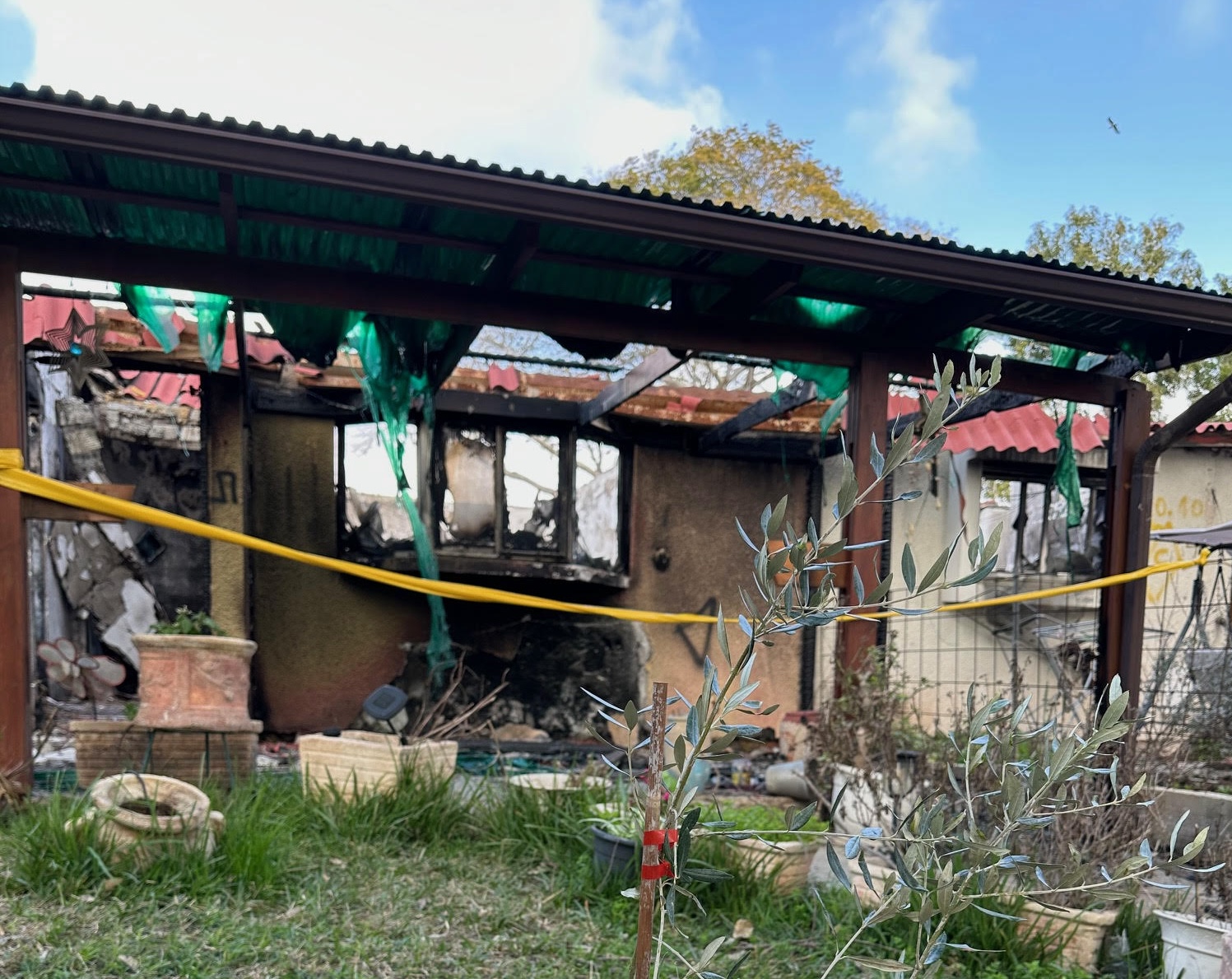
BY K.T. COLIN | In 2019, my first encounter with Israel was through the lens of a sponsored Birthright trip. I embarked on a three-week journey, traversing the diverse landscapes from the northern regions to the eastern territories and finally to the arid southern desert. I had the opportunity to visit different communities within Israel and Palestine. Amidst this exploration, I spent an unforgettable three days and two nights in a kibbutz situated near the Gaza border. The memories etched in my heart were ones of unbridled joy, resilience and the harmonious coexistence of the desert dwellers — an emotional tapestry that forever imprinted itself on my soul. Coming from an Iraqi heritage, I viewed these expressions of coexistence through a lens shaped by my own region’s history of conflict and diversity.
As I recall the Shabbat dinner at the kibbutz, the air resonated with the sacred call to prayers (Adhan) from a nearby Bedouin Arab-Muslim town. The juxtaposition of cultures and faiths was a poignant reminder of the shared humanity that bound the Jewish and Arab Israelis in this region. It was a journey that transcended the ordinary, leaving an indelible mark on my consciousness. Filled with memories of peace and unity, I returned, only to confront a reality far removed from my cherished memories.
Fast forward to last month, when I returned to the Negev Desert, specifically to Kfar Aza — one of the 22 kibbutzim targeted by Hamas on that fateful day, Oct. 7, 2023. The once vibrant oasis, brimming with the light of life, now stood shrouded in the darkness of war-induced death and destruction. The very bench where camaraderie blossomed in 2019, while sharing a moment of connection with an Israeli companion, lay reduced to ashes. The thriving pathways, once bustling with life, had metamorphosed into haunting reminders of blood and rubble. The faces that animated Shabbat gatherings, weaving tales of peace advocacy between Palestinians and Israelis, were now conspicuously absent. In the wake of Hamas’s brutality, no entity — be it human, animal or plant — escaped unscathed. The aftermath resembled scenes from an apocalyptic movie, a tableau of sensory deprivation dominated by the stench of death and the echoes of destruction. This destruction, while uniquely harrowing, echoed the all-too-familiar scenes of conflict from my childhood in Iraq, underscoring the universal tragedy of war.
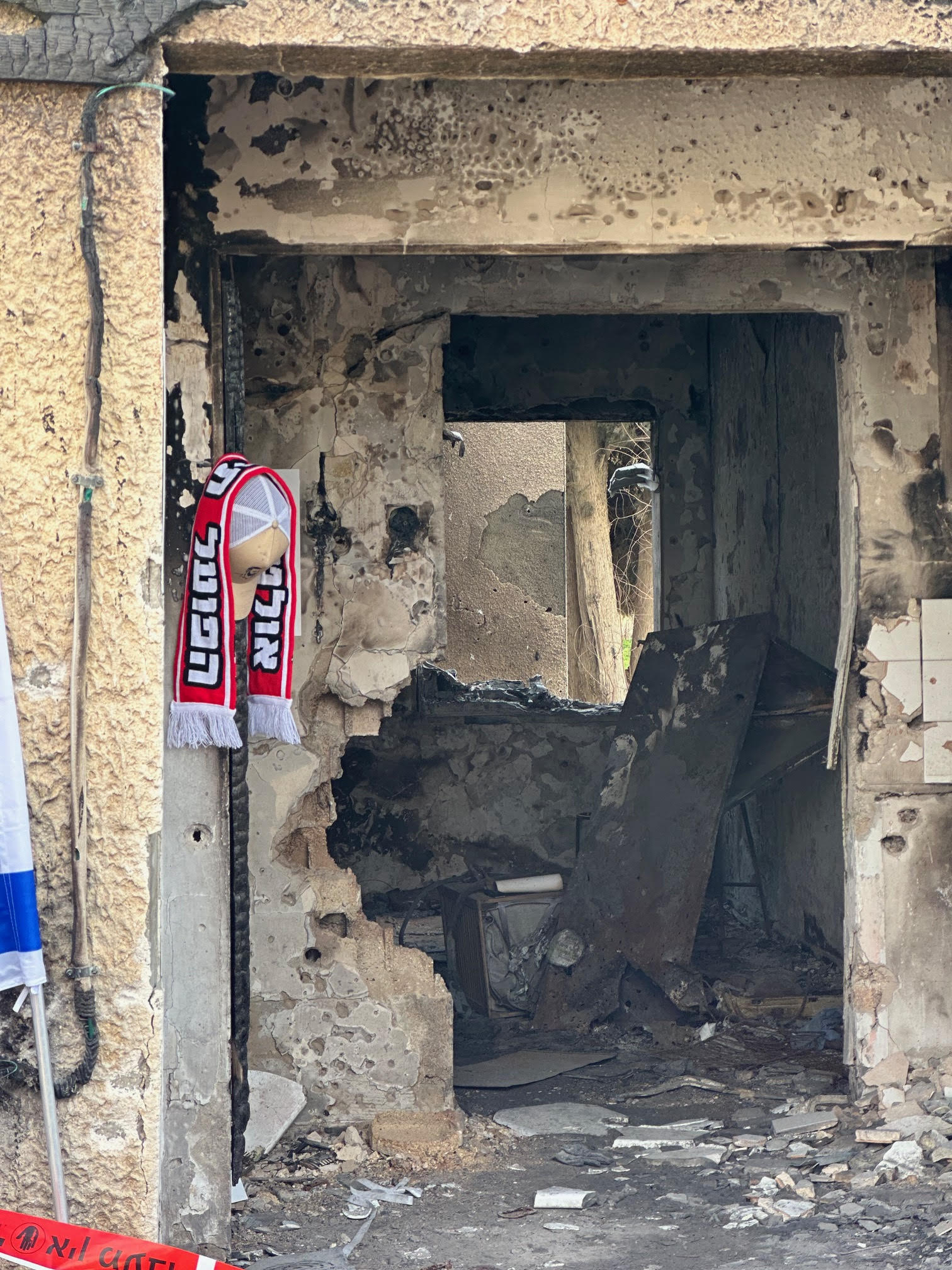
While my roots trace back to Iraq, a land marred by wars and the brutality of conflict, the devastation witnessed in Kfar Aza struck a chord that reverberated with the echoes of my past. My personal journey, from witnessing Saddam’s reign of terror to observing the aftermath in Kfar Aza, underscores a broader narrative of resilience and the enduring hope for peace. Born during the Iraqi-Iranian war, my father’s absence for the first six months of my life spoke volumes about the toll of conflict. The invasion of Kuwait and subsequent wars entrenched the narrative of war as an unwelcome companion in our daily lives. Memories of the U.S. invasion in 2003, the ensuing civil war, and the subsequent loss of rights for women, secular individuals and LGBTQ+ members further underscored the harsh reality of conflict.
Yet, Kfar Aza was a unique chapter in my journey, revealing a form of malevolence that transcended my prior experiences. In their assault, Hamas meticulously targeted specifically peace activists who wanted nothing but peace and prosperity between Israelis and Palestinians, sparing no atrocity in their pursuit. This was not just about taking lives; it was a heinous assault on the very prospect of peace. The evil that unfolded reminded me of the forces mentioned in the Quran — Yaajooj and Maajooj — entities of pure malevolence against whom even Alexander the Great erected a wall, according to Muslim prophecy.
My upbringing in Iraq, under the shadow of Saddam Hussein’s dictatorship, fanned the flames of anti-Semitism. A once diverse Iraq, home to 165,000 Iraqi Jews, witnessed their forced exodus through decades of genocide. Subsequently, Christians, Yazidis and Sabbea Mandaeen fell victim to ethnic cleansing orchestrated by dictatorial regimes, Nazi pogroms, Iranian militias and ISIS. The slow erosion of tolerance and coexistence occurred methodically, propelled by hate campaigns championed by Arab nationalists and later fueled by Islamist movements, plunging Iraq into its darkest era.
My school days were marked by compulsory flag-greeting ceremonies, ostensibly patriotic but laden with hate. The chants of “Death to America; Death to the Zionists; Death to the Jews” echoed through the air, fostering a culture of animosity. Arabization and Nationalism classes further fueled this bigotry, leaving an indelible mark on impressionable minds.
The recent horrors in Kfar Aza echoed memories of a similar brand of terror perpetrated by Saddam’s regime — the Fedaeen of Saddam, a precursor to Hamas’s brutality. The parallels were chilling — beheadings, brutal punishments and a reign of terror continued even after the fall of Saddam, as they joined Al-Qaeda, leaving a trail of atrocities in cities like Fallujah and Ramadi.
As I witnessed the devastation in Kfar Aza, the echoes of war in nearby Beit Hanoun, Gaza, resonated hauntingly. The pain echoed from both sides — the Israeli people enduring Hamas rockets since 2015 and the Palestinians suffering daily under the same regime. My heart shattered for the children left orphaned, the LGBTQ+ Gazans now without shelter or life-saving medications and the vulnerable girls and boys exposed to the horrors of Human trafficking and rape. The theft of humanitarian aid by Hamas left many without food and water, and the lip services to Palestinians by Arab and Muslim majority nations, painting a grim picture of a future hanging in uncertainty for those who survived.
Despite the deep scars of conflict, both in my homeland and here, I see glimmers of hope that guide us toward a shared future. I have endured the darkest chapters of conflict in my past, and I hold onto the belief that one day this war will end. I dream of a future where Israelis and Palestinians coexist in shared spaces, attending the same schools, dining at the same restaurants and dancing in the same nightclubs. Having witnessed such unity among Jews, Druze, Muslims and Christians in Israel, I pray for a day when this reality extends to Gazans and Israelis in the Negev Desert. The journey towards peace is arduous, but the human spirit, resilient and compassionate, holds the promise of a brighter tomorrow.
Commentary
Why come to Washington Plaza Baptist Church?
It’s about the preaching, the people, and the purpose
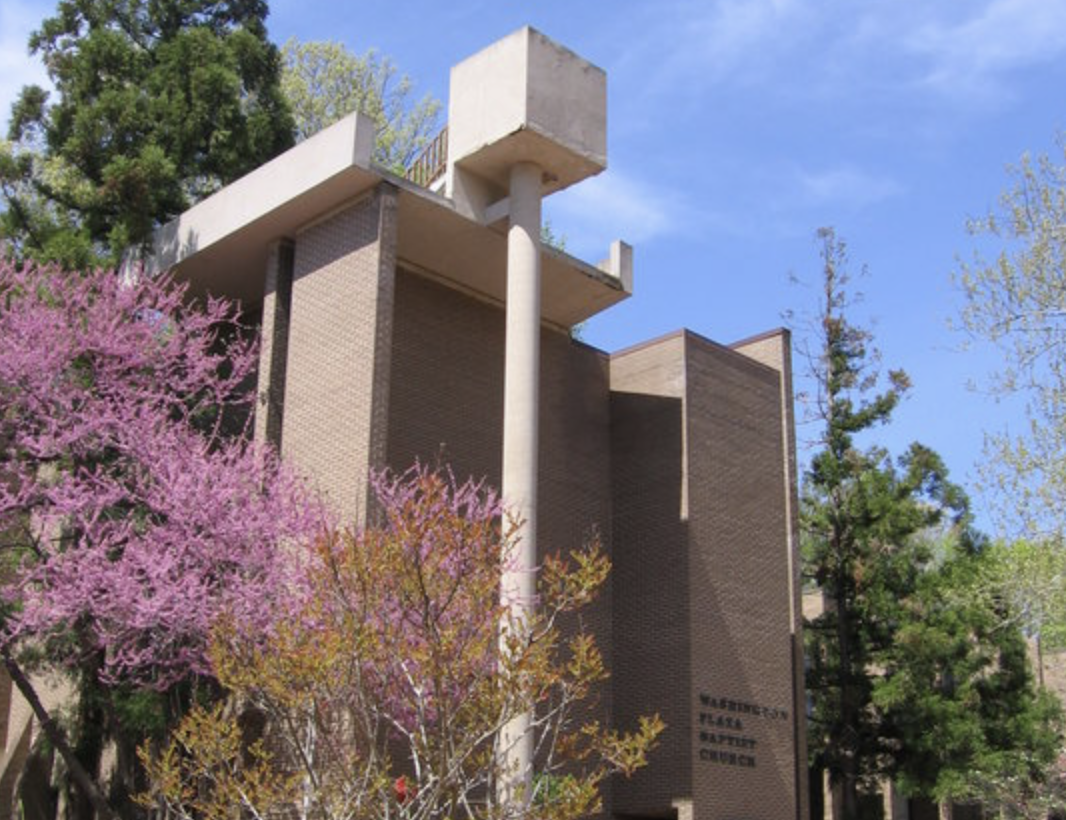
BY ZITA COLLINS | I grew up in a Lutheran church before I really knew who I was. Before my own opinions and belief system were formed. Before “welcoming and affirming” churches existed.
I did the “expected” thing: got married to a man, had children, became a wife and a mom. But I knew there was more to me than that, the part I had to keep hidden because of the society “norms” so many years ago. I attended a Mormon church because that was the type of church my husband attended. As I became more myself having my own opinions and thoughts, and my husband tried to be more controlling, the marriage, of course, failed.
I quit church. I moved on in life and met a wonderful woman. I knew there was a God, but I figured since I was “living in sin” He didn’t like me too much. My way of looking at it was “God, you stay in your corner and I’ll stay in mine, and we’ll get along just fine.” Four years later, in September 1982, my partner was diagnosed with cancer. A couple of months later, she passed away.
During those few months my friend invited me to go to her Assembly of God church. I became a regular. One Sunday in January 1983, I gave my heart and life to Christ, becoming a full-fledged believer. And once again, I gradually put away the part of me that was “unacceptable to God.”
As time went on, I attended various churches. I attended an Anglican church for 15 years. I loved God, but I could not reconcile how I felt — my LGBTQ self — with scripture as I knew it at that time. It was at a church leadership meeting, when we were voting on a new marriage policy to exclude gay marriage, that I realized my “calling”: to tell the LGBTQ community that God really loves them and accepts them as they are.
I studied scripture, praying for clarity, and realized that those “clobber verses” have been traditionally misinterpreted, misunderstood, or taken out of context. I began looking for a church that was friendly to the gay community. I learned that the correct terminology is “welcoming and affirming.”
And I found Washington Plaza Baptist Church!
Warm and welcoming, I felt I had found a home. They knew my identity from the start, as I had let it be known that I was looking for a “welcoming and affirming” church. And they loved and accepted me.
So Who is Washington Plaza Baptist Church?
WPBC is a progressive American Baptist church, located on Lake Anne Plaza, with a long and rich history. It was the first church in Reston, Va., a part of Robert E. Simon’s design for the new town named after him. Washington Plaza Baptist Church is an inclusive Christian Community whose worship, communion, and fellowship are open to all. We are a safe place for all people to worship regardless of race, creed, age, cultural background, gender, or sexual orientation. We affirm that all have access to the love of Christ and service to God.
WPBC is very active in Pride. We were involved with the formation of the first Reston Pride and continue to participate each year. We open our fellowship hall for the performers to change and to cool off, and we have a table on the Plaza where we give away free Pride paraphernalia as well as hugs. WPBC has held weddings for same-sex couples — including my wife’s and mine — with most of our members helping in some way to make the day special.
At Washington Plaza Baptist Church, I have been fully embraced for who I am. I have been in leadership from early on. The pastor, Rev. Michelle Nickens, delivers sermons that are powerful and relevant, with a focus on being Christ-like in all areas, including social justice. The people live out their claim of inclusivity and affirmation. The church community truly loves and cares about the people within the church as well as those outside its doors.
Our address is 1615 Washington Plaza West, Reston, Va. Reach us at 703-471 5225, [email protected]. (We’re on Lake Anne Plaza, right next door to the Lake Anne Coffee House and Wine Bar.)
-

 Africa4 days ago
Africa4 days agoCongolese lawmaker introduces anti-homosexuality bill
-

 District of Columbia15 hours ago
District of Columbia15 hours agoReenactment of first gay rights picket at White House draws interest of tourists
-

 World4 days ago
World4 days agoOut in the World: LGBTQ news from Europe and Asia
-

 Arizona19 hours ago
Arizona19 hours agoAriz. governor vetoes anti-transgender, Ten Commandments bill












